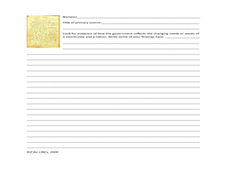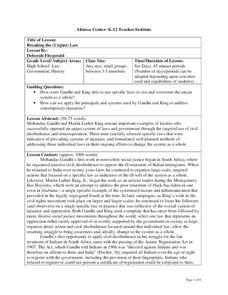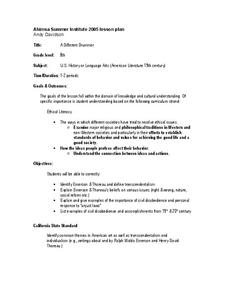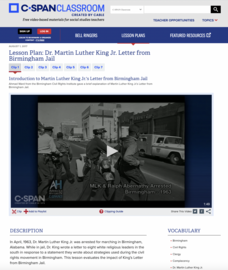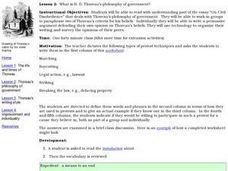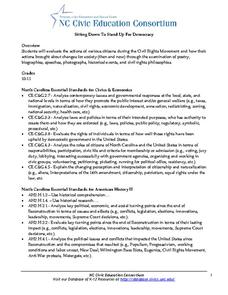Atlanta History Center
Civil Disobedience and the Atlanta Student Movement
What tactics are used in civil disobedience? Learners study the conditions in Alabama that led to the establishment of the Atlanta Student Movement, as well as consider the nature and effectiveness of civil disobedience.
Curated OER
Socratic Seminar on Martin Luther King, Jr.’s Letter From Birmingham Jail
Key in the struggle to gain the rights of democratic citizenship was the April 1963 arrest of Dr. Martin Luther King, Jr. for civil disobedience. To deepen their knowledge and understanding of events during the civil rights movement,...
Curated OER
What is the Role of Civil Disobedience Today?
Learners examine the meaning and use of civil disobedience. They decide whether civil disobedience is a viable form of protest in contemporary times after studying the acts of Rosa Parks.
Curated OER
Tracing the Idea of Civil Disobedience through Thoreau, Gandhi, and King
Young scholars analyze civil disobedience through history studying Thoreau, Gandhi, and Dr. King. In this civil disobedience activity, students read and analyze excerpts from Thoreau, Gandhi, and Martin Luther King. Young scholars...
Curated OER
Civil Disobedience Action Plan
Students investigate incidences of civil disobedience. In this civil disobedience instructional activity, students watch a video and read a newspaper article on civil disobedience. Then, in groups, they search a current newspaper for...
Curated OER
Understanding the Theoretical Basis for Civil Disobedience
Students analyze Henry David Thoreau's 'On the Duty of Civil Disobedience' and Dr. Martin Luther King's "Letter from Birmingham Jail." In this civil disobedience lesson, students read Thoreau's essay and answer 6 questions for the...
Alabama Department of Archives and History
How Would You Feel? The Bravery of Civil Disobedience
As part of their study of the US Civil Rights Movement and the Montgomery bus boycott, class members read Dr. Martin Luther King's "Integrated Bus Suggestions." They then craft a short story about the first week of Montgomery...
Curated OER
The Underground Railroad as an Act of Civil Disobedience
Students write an essay from rough draft to final copy about the Underground Railroad. Civil disobedience is researched from a variety of sources. There is a prewriting exercise that is included in the lesson. The whole writing process...
Curated OER
Gandhi’s 12 Vows: Training Warriors of Non-violence
Learners examine Gandhi’s ‘Walk n Talk’ strategy. In this lesson on civil disobedience, students evaluate Gandhi’s non-violent method of satyagraha as an effective mode of revolution.
Curated OER
Towards Separation of Church and State in Gloucester
Explore New England government in the 1700's with your class. They will identify historical documents as primary or secondary sources, then read and discuss the significance of these documents as they relate to the "freedom of religion"...
Curated OER
Breaking the Unjust Law
Students consider the concept of civil disobedience. In this lesson on changing unjust laws, students use primary sources to understand how Gandhi and King changed the law. Students will then list laws that they feel are unjust and plan...
Curated OER
What Do We Owe To Thoreau?
Students use this design as an electronic reading and writing guide to Henry David Thoreau's famous essay, "On Civil Disobedience." They use activities to familiarize students with the political issues of Thoreau's time. Comprehension...
National Endowment for the Humanities
Martin Luther King, Jr. and Nonviolent Resistance
Was nonviolent resistance the best means of securing civil rights for black Americans in the 1960s? In this highly engaging and informative lesson, your young historians will closely analyze several key documents from the civil rights...
Curated OER
A Different Drummer
Eighth graders investigate philosophy and meditation techniques by discussing Emerson and Thoreau. In this philosophical traditions lesson, 8th graders identify the men Ralph Waldo Emerson and Henry David Thoreau, their work, and...
Museum of Tolerance
The Price of Personal Responsibility
A reading of Patrick Henry's "Speech in the Virginia Convention," Henry David Thoreau's "Civil Disobedience," and Rev. Martin Luther King, Jr.'s "Letter from Birmingham Jail" launch a discussion about the price one is willing to pay to...
K20 LEARN
Plessy v. Ferguson: An Individual's Response to Oppression
After generating research questions rated to segregation, groups are given a primary source document (Jim Crow Laws, Black Codes, Plessy v. Ferguson, etc.) and craft a presentation that details the key elements of their assigned...
C-SPAN
Dr. Martin Luther King Jr.'s Letter from Birmingham Jail
Timing is everything. Introduce young historians to Dr. Martin Luther King, Jr.'s "Letter from Birmingham Jail" with a resource that underscores the significance of the timing of the Good Friday Birmingham march, King's subsequent...
Curated OER
An Eye for an Eye
Students watch a view introducing them to modern Indian History. During the film, they answer discussion quesitons and discover the concept of non-violent civil disobedience. They share their responses with the class and write an essay...
Curated OER
H.D. Thoreau's Philosophy of Government
Students read an essay by H.D. Thoreau as analysis of his philosophy on government. In this Thoreau analysis lesson, students work in groups to paraphrase two of Thoreau's criteria for his beliefs about government. Students write a...
Curated OER
Satyagraha, Its Origins and Applications
Tenth graders study the steps and methods taken by Gandhi. In this World History lesson, 10th graders create illustrations to represent these steps. Students write a persuasive essay on these measures taken by Gandhi.
Facing History and Ourselves
The Audacity of a Vote: Susan B. Anthony’s Arrest
Susan B. Anthony's speech "Is It a Crime for Women to Vote?" takes center stage in a lesson that asks class members to consider how they might respond to what they consider an unjust law. Groups work through the speech paragraph by...
University of North Carolina
Sitting Down To Stand Up For Democracy
Boycotts and bus rides, sit-ins and speeches. The focus of this amazing resource is on those people who were willing to put themselves at risk to take a stand for their belief in equal rights for all. A must-have for your curriculum...
Facing History and Ourselves
Life for German Youth in the 1930s: Education, Propaganda, Conformity, and Obedience
The German youth faced an onslaught of propaganda when they went to school, thanks to the Nazi regime led by Hitler during World War II. Pupils relate their education experiences to German youth by analyzing primary source readings,...
Learning to Live
Attributes of a Civil Society
What makes a society civil? High school freshmen search for examples of justice, kindness, peace, and tolerance in news media and brainstorm how they can promote these attributes in their schools, communities, and world. The well-rounded...
Other popular searches
- Civil Disobedience Thoreau
- Gandhi Civil Disobedience
- On Civil Disobedience
- Thoreau's Civil Disobedience
- Civil Disobedience War
- Thoreau, Civil Disobedience
- Civil Disobedience 60s
- 1960's Civil Disobedience
- Civil Disobedience Thoreau
- Civil Disobedience, Thoreau









